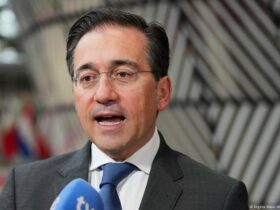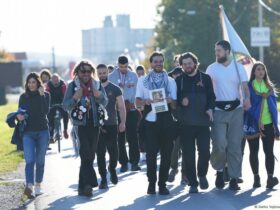Nearly nine months after Kosovo went to the polls to elect a new parliament, the country is mired in a deep crisis and is likely to face snap elections before the year is out.
Vetevendosje (Self-Determination), a party led by Albin Kurti, who has been Prime Minister of Kosovo for more than five years, received about 42% of the vote in the general election on February 9.
Since then, Kurti has been serving as Prime Minister in a caretaker capacity. Still, he failed on Sunday in his attempt to form a new government.
Vetevendosje holds 48 of the 120 parliamentary seats, and Kurti received only 56 of the required 61 votes. This makes him the first election winner in the history of the young state not to be able to form a government.
The ball is now in the President’s court
After the vote, parliamentary speaker Dimal Basha reported that “responsibility has now passed to President of Kosovo Vjosa Osmani.” According to the Constitution, she cannot ask Kurti to form a new government for the second time.
President Osmani, who supported Kurti five years ago, will call for compromise among political parties to save the country from going budget-less.
His spokesman, Bekim Kupina, confirmed that the head of state would encourage political parties to “work together to avoid any blockade that could negatively impact the welfare of citizens and the functioning of institutions in Kosovo.”
threat of financial crisis
Without a new government, Kosovo could fall into financial crisis as the 2026 budget cannot be passed.
In a letter addressed to Osmani, 21 civil society organizations wrote that the lack of a new national budget would hamper the salaries and payments of teachers, doctors, people working in public administration, and social transfers of hundreds of thousands of citizens.
“The country’s financial future and the welfare of its citizens should not be at the mercy of political obstruction,” he wrote.
“Here [Osmani’s] “His experience, his position and his unifying role as President could be decisive in avoiding a crisis that will affect many families.”
political blockade
The three largest opposition parties, the Democratic Party of Kosova (PDK), the Democratic League of Kosova (LDK) and the Alliance for the Future of Kosova (AAK), all refused to enter into a coalition with Vetevendosje and Albin Kurti.
For his part, Kurti refused to enter into a coalition with the Serbian Srpska Lista party, which has nine seats in parliament and is supported by the Serbian government in Belgrade.
PDK leader Memli Krasniqi has left no doubts about his stance: “Fifty-six votes for Albin Kurti and not one for him,” he said. “This is the end of the political deception that has alienated and divided our country and wasted time in recent months. Albin Kurti will no longer be Prime Minister.”
Kurti has announced that snap elections will be held in December. If the outcome is similar to the previous election, the country will face another vote next spring, which will likely coincide with the presidential election. Vjosa Usmani has been in office for five years and his term expires in April 2026.
While a second term in office is possible, a two-thirds majority in parliament would have to approve another term for Osmani or choose a different candidate.
constitutional crisis
Following the parliamentary elections on 9 February, Parliament did not meet for several months and was unable to approve a government. In fact, the Assembly could be convened only after the Parliamentary Speaker was elected a month ago.
When this happened, Deputy Chairman Nenad Rasik was not present. The appointment of Rašić, the only ethnic Serbian lawmaker in parliament who is not a member of Srpska Lista, is disputed by that party.
The case is now before the Constitutional Court, which is investigating the case.
serious impact on the country
Kosovo’s months-long political and institutional crisis has blocked the ratification of the agreement on the EU’s Recovery and Growth Facility for the Western Balkans.
Kosovo could receive more than €880 million ($1,017 million) from the facility. However, not a single cent has been paid till date.
According to the World Bank, economic growth in the Western Balkans will decline from 3.6% in 2024 to 3% in 2025.
Serbia and Kosovo are expected to suffer the most damage. The two countries have been in an EU-facilitated dialogue with each other since 2013, although no notable progress has been made.
Impact on Kosovo-Serbia talks
The fact that Kosovo has only a caretaker government also hinders the country’s negotiations with Serbia.
While the caretaker government has held several meetings with Peter Sorensen, the EU Special Representative for the Belgrade-Pristina talks in Brussels this year, the opposition LDK and PDK have criticized these meetings.
He declared that “Each agreement or obligation reached with Serbia at this stage of negotiations does not create any binding obligations for Kosovo.”
Experts from the Kosovo Institute for Justice (IKD) are of the opinion that the caretaker government can neither legally nor legitimately continue negotiations.
“The constitutional four-year term of this government ended on March 22, 2025. Since then, it has been functioning only in a caretaker capacity, limited to the day-to-day management of public affairs,” said Naeem Zakaj, senior researcher at IKD.
Jakaj’s opinion is that the caretaker government has neither the political support of the Parliament nor the mandate to take steps that could have lasting consequences for the state, including breaking international agreements of a political or legal nature.
“Negotiations with Serbia are a process that requires political decisions at the highest level and full institutional responsibility, which a caretaker government cannot do in accordance with the constitution and law,” Jakaj said.
This article was originally published in German.






Leave a Reply